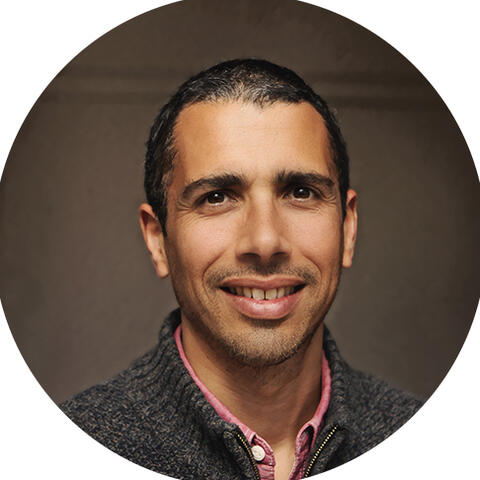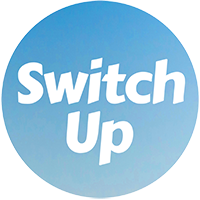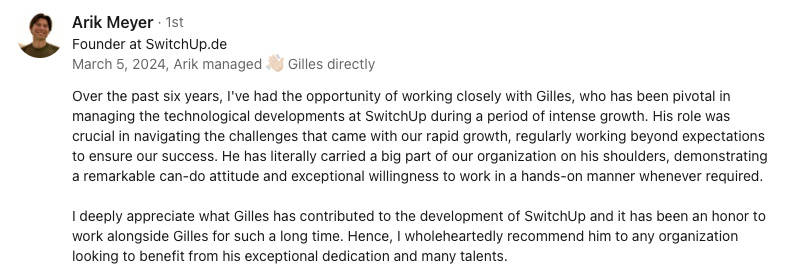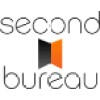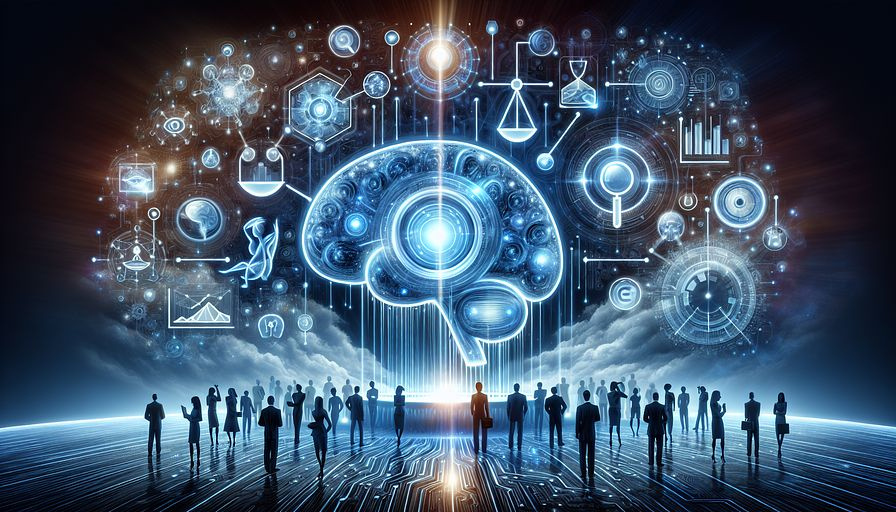Abstract:
As we navigate the shifts in the workforce, understanding and developing future-proof skills is essential for working professionals aiming to maintain relevance and achieve growth. This evolves beyond technological proficiency to embrace adaptive learning, critical thinking, and emotional intelligence. With automation reshaping job scopes, resilience against automation through creativity and problem-solving skills becomes paramount. Additionally, the shift towards remote work environments highlights the importance of effective remote collaboration and digital communication skills. This article explores these essential skills that not only safeguard your career against the unpredictability of technological advancements but also open doors to new opportunities by aligning with the demands of the future workplace.
Introduction to Future-Proofing Your Career
Imagine a world where technology doesn't just walk; it sprints. Where skills that were in vogue yesterday seem quaintly outdated by tea time. This isn't a scene from a science fiction novel; it's the very reality of our professional landscape today. The acceleration of technological advancements has thrown down the gauntlet, challenging working professionals to up their game or risk becoming relics of a bygone era. A not-so-fun fact to chew on: according to a report by the World Economic Forum, 65% of children entering primary school today will ultimately end up working in completely new job types that don't yet exist. If that doesn't make you pause and re-evaluate the tools in your professional toolbox, what will?
The crux of the matter is not just about keeping abreast with the latest software or mastering the current tech buzzwords. Far from it. The quest for career longevity in the face of relentless innovation boils down to a set of core skills that are both timeless and timely. These skills transcend mere technical know-how, embedding themselves in the way we learn, think, and solve problems. They are about adapting to change as much as they are about effecting it. After all, in a world where you can't predict the future, the best strategy is to be prepared to meet it head-on, with a smile and a toolkit ready for just about anything.
The significance of future-proofing one's career can't be overstated. It's akin to putting on an oxygen mask on an airplane - ensuring you're safe before helping others. In the following sections, we'll peel back the layers of what it takes to not just survive but thrive in a workspace that constantly asks, "What's next?" From honing the art of adaptive learning and critical thinking to becoming a maestro at remote work communication, we will explore how these vital skills can make you not only indispensable but also irreplaceable. So, if you've ever wondered how to stay relevant in a world that never stops changing, you're in the right place. Let's explore how to make your career as future-proof as a time traveler's diary.
Beyond Technological Proficiency: Adaptive Learning and Critical Thinking
Let's be frank: understanding the latest technology is about as essential as a morning cup of coffee for today’s working professionals. However, it's merely the entry ticket to the grand show of future-proofing your career. The real stars of the show are adaptive learning, critical thinking, and, not forgetting, a sprinkle of emotional intelligence for good measure. These are the unsung heroes that fortify your career against the winds of automation and the thunderstorms of complexity that are becoming all too common in the professional arena.
Adaptive Learning: The Never-Ending Journey
The journey of learning never truly ends; it just gets more interesting. Adaptive learning is the GPS that helps navigate this journey, ensuring you’re always on the most efficient route. It’s about being as quick on your feet as a cat, ready to pounce on new knowledge and skills as they become relevant. Picture this: a world where technologies like AI and machine learning evolve at breakneck speed. In such a world, the ability to learn, unlearn, and relearn becomes indispensable. But how does one keep this learning spirit alive? It’s simpler (and yet more challenging) than it sounds: stay perpetually curious, seek out new experiences, and never shy away from stepping out of your comfort zone.
Critical Thinking: The Art of Questioning Everything
Imagine if Sherlock Holmes decided to take a detour into the corporate world. That’s the level of analytical prowess and problem-solving acuity critical thinking brings to the table. It’s about not taking things at face value but probing deeper, questioning assumptions, and dissecting problems to their very core. In an age where data is as abundant as opinions on the internet, being able to discern what’s valuable from what’s merely noise is a skill worth its weight in gold. It’s this skill that enables professionals to cut through complexity, identify underlying issues, and forge solutions that are both innovative and effective. Think of it as possessing a mental Swiss Army knife, ever-ready to tackle the myriad challenges thrown your way.
Emotional Intelligence: The Human Touch in a Digital World
In a universe dominated by bits and bytes, never underestimate the power of the human element. Emotional intelligence, the capacity to be aware of, control, and express one’s emotions judently while handling interpersonal relationships empathetically, is the secret sauce that makes technical skills truly impactful. It’s what enables collaboration, drives teams towards common goals, and soothes frayed nerves during high-stress projects. It’s also your best defense against becoming another cog in the machine, easily replaceable by automation. Being able to connect, understand, and motivate those around you is what makes you not just a part of the team but an invaluable leader within it.
In essence, the journey to fortifying your career against the tests of time and technology is less about mastering every new gadget or programming language that hits the market. Sure, those are important, but at the heart of it all, the true game changers are the skills that empower you to keep learning, questioning, and connecting. They transform you from a mere participant in the relentless race of innovation to a confident navigator, steering your career with wisdom, empathy, and a tactical edge. So, as we march forward into the unknown, let's arm ourselves with these timeless skills and face the future with a resolute smile. After all, who says you can’t teach an old dog new tricks?
Facing the Future: Creativity and Problem-Solving in the Age of Automation
As we glide through the technological expressway, automation is redefining the scope of jobs across various industries at warp speed. With machines taking over tasks ranging from the mundane to the complex, the spotlight turns to creativity and problem-solving skills as the indispensable duo of the workforce. Why? Because, unlike repetitive tasks, the nuanced process of creative thinking and effective problem-solving is a uniquely human capability that machines are yet to crack. This narrative explores the burgeoning value of these skills and offers a roadmap to weave them into the fabric of your professional identity.
Creativity: Your Secret Weapon
In an arena where robots can replicate almost anything, creativity stands tall as the indomitable human quality that machines can't mimic. It's the spark that fuels innovation and drives the conception of products, services, and solutions that genuinely resonate with human needs and emotions. Take, for instance, the story of an engineer who reimagined the use of drone technology for delivering essentials in remote areas. By thinking outside the proverbial box, the engineer not only solved a critical problem but also opened up new avenues for humanitarian aid, all thanks to creativity.
To fertilize the creative soil of your mind, consider the following:
- Embrace diverse experiences: Actively seek out new experiences and perspectives to broaden your thinking horizons.
- Practice ideation: Regular brainstorming, alone or in groups, can spark creative insights that lie dormant.
- Allow for failure: View failures as stepping stones to innovation rather than roadblocks.
Problem-Solving: The Art of Tackling Challenges
If creativity is the spark, problem-solving is the engine that turns ideas into tangible outcomes. It's about dissecting challenges into their core components and drafting a blueprint for victory. Consider a tech company that encountered a major security flaw in its software. Instead of panicking, the team utilized forensic IT skills combined with strategic thinking to isolate the issue, design a patch, and roll out an update—effectively turning a potential crisis into a testament to their problem-solving prowess.
Here are some strategies to enhance your problem-solving skills:
- Adopt a learner's mindset: Cultivate a thirst for knowledge and a willingness to learn from every situation.
- Practice structured thinking: Break down complex problems into manageable parts to find clear solutions.
- Seek feedback: Use constructive criticism as a tool to refine your problem-solving approach.
In the age of automation, the duo of creativity and problem-solving emerges as the superheroes of the professional world. They enable us to envision possibilities beyond the binary code and concoct solutions that are as effective as they are innovative. Making these skills a cornerstone of your professional toolkit ensures not only your indispensability but also your resilience and adaptability in an automated workforce. Remember, machines might be able to replicate tasks, but the human element of creative thinking and strategic problem-solving is irreplaceable. So, let your imagination run wild, and tackle challenges head-on with a blend of creativity and analytical acumen. Who knows? The next big innovation could have your name on it.
By fostering creativity and honing your problem-solving skills, you're not just preparing for the future; you're shaping it. These capabilities offer a buffer against the encroachment of automation, guaranteeing that no matter how sophisticated machines become, there's always a coveted space for the human intellect in the workplace. So, as we stride into an automated future, let's do so with the confidence that our creative and analytical abilities will remain our most treasured assets. After all, it's not every day that you get to outsmart a robot.
Mastering Remote Work: Effective Collaboration and Communication
In a professional world where "WFH" has evolved from a temporary measure to a mainstay of corporate culture, mastering the art of remote work is not just a fancy skill—it's an essential survival kit. With home offices becoming as standard as the morning coffee run, the ability to collaborate and communicate effectively across digital channels has catapulted to the top of the must-have skills list. But fear not; traversing the digital divide between your kitchen-turned-office and your colleagues sprawled across different time zones can be as seamless as your favorite joggers. Let's walk through how you can refine these skills to not only bulletproof your career but also pry open doors to new opportunities and a cherished work-life harmony.
Collaboration in the Digital World
Gone are the days when brainstorming sessions were confined to whiteboards and sticky notes in a meeting room. In the remote work era, collaboration happens on a spectrum of digital platforms, from project management tools to virtual whiteboards. Your mission, should you choose to accept it, involves cultivating a collaborative spirit that transcends physical boundaries. This involves:
- Choosing the right tools: Equip your team with collaboration tools that everyone is comfortable using. Think of tools like Slack for communication, Trello for project management, and Miro for brainstorming sessions.
- Setting clear expectations: When everyone is just a profile picture on a screen, clarity is your best friend. Define clear roles, responsibilities, and deadlines for projects to keep everyone on the same page.
- Creating a culture of inclusivity: Encourage participation from all team members, ensuring that even the quietest voices are heard. Virtual coffee breaks or non-work-related catch-ups can foster a sense of belonging and team cohesion.
While the leap from in-person to virtual collaboration might seem daunting at first blush, remember that the essence of teamwork doesn't change—it just gets a digital upgrade.
Communicating with Clarity and Empathy
If collaboration is the ship, communication is the compass that guides it. In the remote world, where face-to-face interactions are few and far between, every email, instant message, and video call counts. The art and science of communication in this context stretch far beyond the mere exchange of information. It encompasses:
- Being clear and concise: With digital communication, it's easy for messages to be misinterpreted. Aim for clarity in your communication, avoiding jargon and being as specific as possible.
- Emphasizing written communication: Brush up on your writing skills, as emails and project updates become your primary mode of interaction. Remember, what once could be clarified with a quick chat across desks now requires a well-crafted message.
- Practicing empathy: Without the non-verbal cues of in-person communication, it's crucial to read between the lines and consider the tone of your messages. A little empathy goes a long way in maintaining morale and building trust within your team.
Adapting your communication style for the remote environment can transform the way you connect with your team, ensuring that distance does not become a barrier to effective collaboration.
As the curtains draw on our exploration of how to future-proof your career amidst shifts to remote work scenarios, remember that the essence lies in embracing change with open arms and a Wi-Fi connection. The ability to collaborate and communicate effectively, regardless of where your desk is located, not only bulletproofs your career but also flings open the gates to new horizons of opportunities, personal growth, and a work-life nirvana that was once thought elusive.
So, as we venture forth, let's arm ourselves with the digital prowess of effective communication and collaboration. These skills are more than mere tools; they are the lifeblood of remote work success, ensuring we can not only navigate but also thrive in the vast ocean of digital workspaces. Knights in shining armor? More like professionals in comfy sweatpants, armed to the teeth with Zoom links and productivity apps, ready to conquer the world—one click at a time.
You might be interested by these articles:
- Essential Skills for Tomorrow's Workforce
- Navigating Work's Next Horizon
- Thriving in Europe's Tech Maze: Turning Challenges into Opportunities
